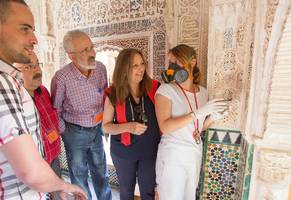Conservators from the Alhambra give technical training to Moroccan restorers as part of the REDALH project
Granada, 2 July 2013. This week Conservators from the Council of the Alhambra and Generalife will be holding a technical training workshop for Moroccan restorers. This workshop is part of the activities organized by Redalh a European project for Cross-Border Cultural Heritage: Creation of Networks of Heritage Management Professionals, the objective of which is the recovery, preservation and dissemination of craft heritage.
This morning the Director of the Council of the Alhambra and Generalife, María del Mar Villafranca, together with the architect conservator of the monument and Director of the Redalh project, Francisco Lamolda, inaugurated these workshops with a visit to the Lindaraja Balcony. Satisfied by the progress being made in this programme, Villafranca commented that “this project is helping to recover craft techniques that might otherwise have disappeared. The Alhambra is a landmark in this field and Redalh will create new sources of knowledge”
The Moroccan delegation who will be doing the training workshop this week in the Alhambra consider the results of the REDALH project “highly positive” as the “exchange of experiences benefits everyone. This week we are going to enjoy the Alhambra, this great book of knowledge. We are going to gain a better understanding of the way the Nasrid craftsmen worked” commented the director of the Tetouan Modern Art Centre, Bouzaid Bouabid.
The group that will be doing the training course in the Alhambra this week is made up of conservators and restorers from Tangier and Tetouan, the conservators of historic monuments (Tangier), Abdelaziz el Idrissi; the conservator of the Archaeological Site of Ksar Sghir, Abdellatif El Boudjay; the Director of the Andalusian Studies Centre in Chefchaouen, Charafdine Majdouline; the conservator of the Tamuda Archaeological Site, Tarik Moujoud; the conservator of the Tetouan Archaeological Museum, Anas Sedrati, and the master craftsman of the Tetouan School of Art and Craft, Abdeljalil Rourou.
The training sessions will be of a practical nature and will involve a visit to the different spaces in the Group of Monuments in which restoration work has already been done or is currently in progress. In this way the participants will be in direct contact with the products, techniques and procedures applied in the different restorations carried out by the restorers of the Alhambra.
The plasterwork pieces and the techniques used in making them will be the main topic on Tuesday, 2 July. After visiting the plaster workshop in the Alhambra, the visitors will admire the muqarna domes of the Gallery of the Hall of the Kings and the Lindaraja Balcony in the Nasrid Palaces. A trip around the Albayzin Centre is scheduled for the afternoon.
On Wednesday, 3 July, wood, its use and the main causes of its decay will be the main theme of the visit by the Moroccan experts to the restoration workshop of the Council of the Alhambra and Generalife. They will then be able to study in situ the work done on the ceiling of the entrance room and the door of the Abencerrajes; in the coloured-glass ceiling frame in the Lindaraja Balcony, and the wooden vaults with paint on leather.
The restoration of the tilework in the Alhambra will be the main item on the agenda for Thursday 4 July. The day will begin with a visit to the Alhambra restoration workshops and then the participants in this training program, organized by the Alhambra as part of the Redalh project, will be shown the Hall of Beds in the Bath of Comares, before finally attending a presentation on the restoration project for the Jamba intrados of the arch leading into the Hall of the Two Sisters and the ceramic encrusted in the skirting features in the Lindaraja Balcony. Later there are plans for visits to the workshop of the ceramic artist Miguel Ruiz in the Arts Pavilion in Jun.
The Redalh project has the support of the European Union in the form of a grant of over €350,000 from the regional development funds (FEDER), as part of the Cross-border Cooperation Program Spain – External Frontiers (POCTEFEX).
In order to find similarities between the craft techniques and materials used in buildings by the Nasrids in the province of Granada and the Marinids in the Tetouan – Tangier region of Morocco, the project will be divided into several phases, which will be carried out until December of this year, focusing on scientific research on the decorative use and craft techniques of wood, ceramic and plaster; innovation in restoration workshops and specialized training by the passing on of knowledge.
The grand finale to the project will be a travelling exhibition in the Alhambra, Tetouan and Tangier of pieces arising from the research. In order to consolidate the network established to enable the professionals to continue working together, Redalh will also have its own website www.redalh.eu, which will be extended and enriched with new contents as the work progresses.
The Cross-Border Projects only permit collaboration between regions on the shores of the Mediterranean. Redalh works in the Tetouan-Tangier region of Morocco and in the province of Granada with the Council of the Alhambra and Generalife.


Más información en www.fundacionrodriguezacosta.com
https://twitter.com/alhambracultura
Síguenos en https://www.facebook.com/alhambragranada
https://www.facebook.com/alhambragranada





 Contact
Contact
















